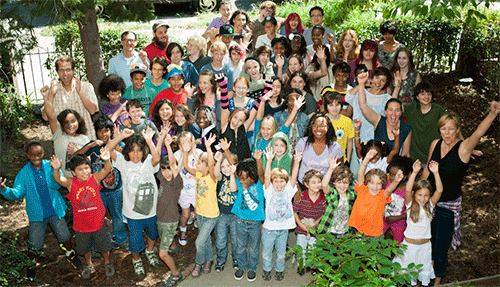
click here to view the spanish translation.
by Jerry Mintz
 Many parents don't realize that the education world has changed drastically since they were in school. Schools and class sizes used to be smaller, dropout rates lower, in-school violence almost unheard of, and teachers weren't terrified of showing affection to their students, or of discussing moral values. Of course, even then, school was far from perfect, but at least the teachers—and usually the principal—knew every student by name, something that is increasingly rare today.
Many parents don't realize that the education world has changed drastically since they were in school. Schools and class sizes used to be smaller, dropout rates lower, in-school violence almost unheard of, and teachers weren't terrified of showing affection to their students, or of discussing moral values. Of course, even then, school was far from perfect, but at least the teachers—and usually the principal—knew every student by name, something that is increasingly rare today.
Because our public school system has deteriorated considerably, many parents, teachers, and individuals have taken it upon themselves to create public and private alternatives to that system; and it is important for parents to know that they now have choices.
So how do you know that it's time to look for another educational approach for your child? Here are some of the signs:
1. Does your child say he or she hates school?
If so, something is probably wrong with the school. Children are natural learners, and when they're young, you can hardly stop them from learning. If your child says they hate school, listen to them.
2. Does your child find it difficult to look an adult in the eye, or to interact with older or younger children?
If so, your child may have become "socialized" to interact only with peers within their own age group—a very common practice in most schools—and may be losing the ability to communicate with a broader group of children and adults.
3. Does your child seem fixated on designer labels and trendy clothes for school?
This is a symptom of an approach that emphasizes external rather than internal values, causing children to rely on shallower means of comparison and acceptance, rather than deeper values.
4. Does your child come from school tired and cranky?
While a student can have a hard day in any school, consistent exhaustion and irritability are sure signs that their educational experiences are not energizing, but actually debilitating.
5. Does your child come home complaining about conflicts that they've had in school, or unfair situations that they have been exposed to?
This may mean that the school does not have a student-centered approach to conflict resolution and communication. Many schools rely on swift, adult-issued problem solving, depriving children of their ability to emotionally process and thoughtfully discuss the situation at hand.
6. Has your child lost interest in creative expression through art, music, and dance?
Within the traditional system, these creative outlets are often considered secondary to "academic" areas, and are not as widely encouraged. In some cases, courses in these areas are not even offered any more. This neglect often devalues, or extinguishes, these natural talents and abilities in children.
7. Has your child stopped reading or writing—or pursuing a special interest—just for fun? Are they investing the bare minimum in homework?
This is often a sign that spontaneous activities and student independence are not being valued in their school. Children have a natural inclination to direct their own learning; however, an emphasis on meeting standardized test requirements limits the abilities of teachers to nurture and encourage this inclination. The result can be an increasing apathy toward subjects that were once exciting, and a loss of creativity.
8. Does your child procrastinate until the last minute to do homework?
This is a sign that the homework is not really meeting his or her needs—perhaps it's “busy work” or rote memorization—and may be stifling to their natural curiosity.
9. Does your child come home talking about anything exciting that happened in school that day?
If not, maybe nothing in school is exciting for your child. Why shouldn't school—and education—be a fun, vibrant, and engaging place?
10. Did the school nurse or guidance counselor suggest that your child may have a "disease," like ADHD, and should be given Ritalin or another behavior regulating drug?
Be wary of these diagnoses and keep in mind that much of the traditional school curriculum these days is behavior control. If test requirements limit a teacher's ability to engage students, if students are discouraged from following their own passions and expected to sit for five or six hours a day with limited personal attention and interaction, I suggest it's the school that has the disease, EDD—Educational Deficit Disorder—and it might be time to get your child out of that situation!
If your child has exhibited several of these characteristics, it's time for you to start looking for an alternative. In most parts of this country today, there are many options to choose from—public and private. For example, 40 states, the District of Columbia and Puerto Rico have now enacted legislation which allows groups of parents and teachers to create charter schools, which are not stuck with having to fulfill as many of the myriad of state regulations and can create their own individualized approach. There are now more than 4000 of them. There are also 4,500 magnet schools throughout the country, public schools that specialize in an area of expertise, and draw students from a wider geographic area.
Additionally, there are over 4,500 Montessori schools, based on the experiential approach designed by Dr. Maria Montessori, and hundreds of Waldorf schools, which put equal emphasis on traditional academics areas and the arts. There are also hundreds of independent alternative schools, many emphasizing participant control, with parents and students taking responsibility for their own educations. The latter are often called democratic schools, free schools, or Sudbury schools.
Many public school systems, too, have a variety of alternative programs within their systems. These are divided into two general approaches:
1. Public Choice; programs which are open to any student in the community. Sometimes they are called Schools Within Schools.
2. Public At-Risk; programs for children who have had a variety of problems coping with school. These programs run the spectrum from helpful to dumping grounds. Examine them closely before making a decision to enroll.
Parents of well over a million children in this country have checked off "none of the above" and decided to teach their children at home. It is now legal in every state and does not require teacher certification. Homeschooling has taken a variety of approaches. Some try to create "school at home" with a fairly standard curriculum, the main difference being that parents can teach one-to-one with their children. Some families have signed up with a curriculum designed by an umbrella school; this school will help the parents create their own curriculum or, provide its own basic curriculum, grade homework, and help with any necessary report forms.
A third approach is called "unschooling." In this case the parent bases their educational approach on the interest of the child and builds on that, rather than a pre-set curriculum. In some cases, curriculum is designed "retroactively," by keeping records of the activities throughout the year and at the end of the process dividing the experiences into the appropriate subject area.
Remarkably, since most states require some form of testing for homeschoolers, as a group, they average in the 85th percentile, compared to the 50th percentile of the average public school student. There are now so many homeschoolers around the country that virtually all of them are part of some kind of homeschool group. Some of these groups have coalesced into homeschool resource centers and operate as often as four or five days a week. Generally, colleges have discovered that homeschoolers make such good students that they welcome them to apply to their schools.
As more and more parents become aware of, and make, these choices, we hope that the traditional system will evolve into one that meets the needs of an increasing number of students. Meanwhile, don't wait for that system to change; take responsibility for your child's education. Find out what your options are and choose what is best for your child.
None of these signs by themselves should be taken as a reason to panic. But if you have noticed several of them, you should certainly explore educational alternatives.
Find a school that works for your child: AERO Member Schools, Schools AERO Helped to Start, and Democratic Schools.
Get the resources you need to help you in making your decision here.




